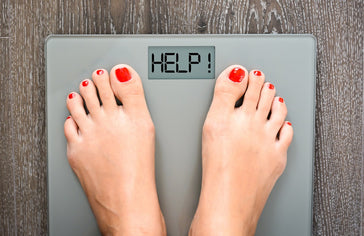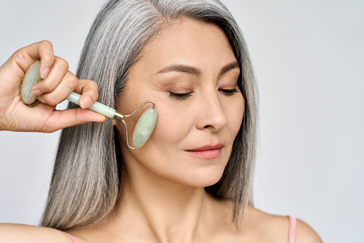The Truth About Artificial Sweeteners
Posted by Mike Miryala on
Welcome back everyone, it is Becky Williams and I'm super excited about this week's video. We are going to be talking about Artificial Sweeteners.
Now, there's a lot of questions around what is an artificial sweetener? What is a keto approved sweetener? What's okay for all these different diets and stuff?
And so today I just wanted to talk to you specifically about the ones to avoid. So, you probably heard of negative effects of just too much sugar in general, like just white sugar, especially added sugar, like in a soda pop or Cokes, depending on where you live is what you call that candy, baked goods, commercial available cereals, you know, all those things that we already know that have bad sugars in them because it's the white sugar. But adding added sugar is actually hiding everywhere in the grocery store.
If you've ever done a eating plan such as like Whole30, you realize once you start flipping those bottles over, flipping those boxes over that the amount of added sugar that's in things that you would not think is just astounding. So, we all understand that ingesting refined sugar is going to spike your blood sugar. It's going to spike your insulin, which is going to increase your risk for a whole host of issues. I have insulin resistance. It's something that I have to be very careful with on the way that I eat because it's very easy to just get off kilter and get off balance with that.
A while ago, one of the food industries responded to the demand for the lower calorie foods that still tasted great, that is actually whenever they introduced artificial sweeteners because they figured that these artificial sweeteners would be better than the white sugar, but then that way we wouldn't have to give up these yummy, tasty treats and we'd be able to follow all of these low calorie type diets. That's why they came up with that.
So the idea behind it is that you still get the sweetness without the calories. Sounds good. You know, it sounds great just in theory. But, let's kind of break it down just a little bit more and see, is this actually a great thing or not?
So let's talk about the types of artificial sweeteners first. Sugar substitutes fall into several categories. What they do all have in common is that they have a sweet taste and fewer calories than plain sugar. Today, I'm going to talk specifically about artificial sweeteners though, which are synthetic chemicals. I want to be very clear. These are synthetic chemicals where just a tiny little bit is going to be very sweet. So most of the time, artificial sweeteners, I'd say like 99% of the time, just in case there's one I don't know about, but they're going to actually be sweeter than regular sugar. So you don't need as much, which also sounds like a good thing, but just hear me out, okay? These are known as non-nutritive sweeteners. They include saccharin. So you maybe recognize this like Sweet'n Low.
All right. Then you also have acesulfame potassium. You have aspartame, which I know that a lot of us are familiar with that, which would be like Equal or NutraSweet. And then sucralose. This was one that just really took off in the very beginning. This is the Splenda product. In the very beginning, everybody thought that this was such a great thing. It's this brand new sweetener. Everybody loves it. Everybody wants to use it in everything. You've got Splenda you can bake with. You've got Splenda that's powdered sugar. You've got the granular. You've got the liquid. And it sounded really good. Let's talk about the health effects of artificial sweeteners, okay?
Notice I did not say Stevia. I did not say Erythritol. I did not say Xylitol. I did not say any of those. Those are not considered artificial sweeteners. Those are naturally derived sweeteners that are approved on a lot of the more popular eating plans right now, like keto, different things like that, okay? I'm trying not to get off on a tangent because these videos end up being too long whenever I do that. So I'm sticking to my notes. All right.
The health effects of artificial sweeteners. Negative health effects from artificial sweeteners are cited all over the place. It's very easy. Just do a quick Google search. You will find out. Many of the people, though, that read the side effects just don't care. I don't know if it has to do with being addicted to sweetness, addicted to sugars. I'm sure that has a big part of it. A lot of the studies show the effects of artificial sweeteners and then, of course, just like everything in health. And you can find the other side of it that says, no, it doesn't cause cancer. No, it doesn't cause heart disease, okay? So you're going to have research both. Not to mention a lot of these things are actually being researched on animals. So we don't necessarily know if that translates to people or not.
So, I do want to point out one ironic thing to do with artificial sweeteners and weight, though. One study found that people who tend to drink diet sodas have double the risk of gaining weight than those who don't. So if you thought that you were doing good because you ate this low calorie meal and then you added like a diet Coke to it, studies are showing you actually may gain more weight doing that.
Another study showed an increased risk for metabolic syndrome and Diabetes for those who consume diet drinks every day. So that's not good. While these results don't apply to everybody, they do somehow seem pretty ironic, right? You think you're doing something by getting rid of the white sugars you put in this other chemical, get the same sweetness, but not the calories, and it's still going to cause you to gain more weight. All right.
So how do artificial sweeteners actually affect our bodies? Let's get down to the nitty gritty of this topic today. There are so many ideas out there trying to explain it, but the reality is we don't know for sure. Plus, it might play out differently in different people. So these are just different ideas, different questions, different things to ponder about. Is it because that people feel that they can eat cake because they've switched to diet soda? Is that why they're going to gain weight because they're eating more things, because they think that they're using this no calorie sweetener? Perhaps is it because sweeteners change the taste preferences, so fruit starts to taste worse and vegetables taste even worse than that, because your taste buds do change based on what you're eating. So is that why people are gaining more weight on this or why they're having increased risk of disease and things like that?
Maybe artificial sweeteners increase our cravings for real sweets. I personally found that this is true in my world. Whenever I have too much of an artificial sweetener, let's say I do something that's like a pre-made treat, like a bar or something that's real low calorie. I don't often do that. But a lot of times sugar-free stuff is going to be with the sucralose, even if it is advertised as healthy. For me, it makes me crave more, more sweets in particular.
It can also be the sweet taste of sweeteners signals our body to release insulin to lower our blood sugar, but because we didn't actually ingest any sugar, our blood sugar levels do get too low to the point to where we crave again. So that could also be what is happening, why we're gaining more weight using artificial sweeteners.
Some even say at least one animal study suggests that saccharin may inspire addictive tendencies towards it. So you start wanting more and more and more, you're increasing it, you're increasing the chemicals in your body, so does that lead to the disease? So there's a lot of different schools of thought on this. And maybe there's even a more complex response that involves our gut microbiomes and how that affects on our blood sugar levels.
So in conclusion, understand added sugar is not good for you, whether it's white sugar, whether it's artificial sugar, replacing with these artificial sweeteners are not going to help your health. That is the conclusion that I want to give to you today.
I highly recommend reducing your sugar intake just naturally so that you naturally retrain your palate to start enjoying the taste of real food that isn't overly sweet. I can attest to this whenever, I'm getting off my notes again, but whenever I stopped consuming so much sugar, I noticed that fruit tasted better, vegetables tasted better, everything just tasted better.
Whereas before, I have family that have always eaten healthy and they'd say, why don't you just eat fruit for a dessert? I'm like, fruit for dessert? Why would I do that? But now it tastes wonderful. It's really good and it really does change your palate. This way you're reducing your intake of sugar, added sugar, as well as not needing to replace with artificial sweeteners. So when you retrain your taste buds, you don't need to replace, you get to just eliminate.
Also try having half a teaspoon less of sugar in your hot morning drink. That can be your step number 1. Remember I've talked about in past videos that big doors are going to be turned with small hinges. So thinking that just reducing half a teaspoon of sugar in your morning coffee or a fourth a cup in your recipes that you're making, you don't think that that's going to be a big deal. But those small little changes over time, day after day, that's what's going to make the difference. Also, if you drink a lot of juice, you can try diluting that with water.
Great tips, great way to start with. Okay. I'm going to end today with a recipe that is naturally sweetened, which is called Sweet Enough Matcha Latte. This is going to serve one person. So go ahead and whip it up. You can have it right after you watch this video. You need:
- 1 teaspoon of matcha powder
- 1 ½ cups of almond milk, unsweetened please
- 1 - 2 teaspoons of maple syrup or honey. This is optional. If you're on one of our eating plans that these are not included, skip it. Add stevia if you would prefer, add xylitol if you prefer.
We do like most of the Swerve products. So if you're here in the US, I'm not sure about outside of the US if they have that available with Amazon or not, which is just, it's a blend of erythritol and a blend of, I think inulin is in it. And then stevia, also any monk fruit, as long as it's pure monk fruit or monk fruit with the erythritol, all those are okay. All right.
So here are the directions.
- Heat your unsweetened almond milk and your maple syrup or your honey. Or you could do liquid stevia, like I said, whichever you prefer, in a small pot.
- Add the matcha powder to a cup. When the almond milk is hot enough, you can add a fourth a cup of matcha and stir it and add the rest of the milk that's in the cup.
- Serve it and enjoy it. Also you could steep like a bag of chai tea instead of the matcha if you wanted to do that.
So hopefully this recipe helps you make the small change today. Just start slowly, steadily reducing that sugar intake so that you're not having to switch off to something that's a chemical that could potentially cause more issues in your body.





